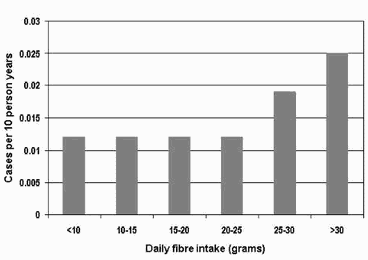Climb Off the Bran Wagon
Part 2: Fibre and colon cancer
Animal studies have variably suggested that dietary fibre reduces risks, increases risks, or has no effect on bowel cancers. Epidemiological studies on humans have also found that intakes of dietary fibre are either protective, or have no effect; there is also a growing scepticism in the US that lack of fibre causes cancer; some studies have even suggested that a fibre-enhanced diet may increase the risk of colon cancer.7
In the mid-1980s dietary fibre was shown to increase the risk of colon cancers.8 In 1990 the British Nutrition Foundation admitted that the hypotheses that irritable bowel syndrome (IBS), diverticulosis and colorectal cancer were caused by a deficiency of fibre had not been substantiated; and neither had claims that fibre might protect against diabetes, obesity and CHD.9 The Seventh King's Fund Forum on Cancer of The Colon and Rectum commented that: 'cereal fibre does not offer protection against cancer.'10
In 1995 Dr M. Inoue and colleagues published an investigation of cancers at several colorectal subsites: ascending, transverse, descending, sigmoid, and rectum, within a Japanese hospital environment. They concluded that loose or soft faeces are a significant risk factor for cancer at these sites.11 But bran loosens and softens faeces — that's why it is recommended.
The following year Drs H. S. Wasan and R. A. Goodlad of the Imperial Cancer Research Fund showed that bran can increase the risk of colorectal cancers.12 'Many carbohydrates,' they said, 'can stimulate epithelial-cell proliferation throughout the gastrointestinal tract,' and concluded: 'Until individual constituents of fibre have been shown to have, at the very least, a non-detrimental effect in prospective human trials, we urge that restraint should be shown in adding fibre supplements to foods, and that unsubstantiated health claims be restricted . . . Specific dietary fibre supplements, embraced as nutriceuticals or functional foods, are an unknown and potentially damaging way to influence modern dietary habits of the general population.' This study spawned several critical letters. It comes as no surprise that half were from people connected with the breakfast cereal industry.13
The results of a very large, long-term trial also suggest that, contrary to popular belief, high dietary fibre intake does not protect against colorectal cancer.14 Researchers at Harvard Medical School and the Dana-Farber Cancer Institute, both in Boston, Massachusetts, studied 88,757 women over 16 years. They say: 'no significant association between fiber intake and the risk of colorectal adenoma was found.' But there was what they call an 'unexpected' finding, in that, according to their data, a high consumption of vegetable-derived fibre was actually 'associated with a significant increase (35%) in the risk of colorectal cancer'.

That fibre increased the risk of colon cancer was confirmed six years later by a large analysis of 17 studies of the effect of dietary fibre on colorectal cancer.15 Although the abstract of the study said that people with the highest intakes of fibre had a reduced risk of colon cancer, that was exactly the opposite of what the study data showed. Using the study's Table 3, dividing the number of cases of colorectal cancer by person-years of exposure, and multiplying by 10 to obtain number of cases per 10-person-years, since the mean study length was about 10 years, the effect was not a reduction in cancers as fibre intake increased but an increase. This is graphically illustrated in Figure 1. Lead researcher, Yikyung Park, said that 'There are more questions to be answered but clearly this adds to the growing body of evidence finding that high fiber intake does not lower the risk of colorectal cancer.'
Fibre and heart disease
The idea that fibre could protect against coronary heart disease was hypothesized by Dr Trowell in 1973,16 again based on research on rural Africans. But while pectin, guar gum, fruit and vegetables lowered blood cholesterol levels, they were not lowered by wheat fibre (bran), or a diet containing wheat and whole maize. There is little evidence that fibre of any type is effective in reducing levels in the blood of triglycerides or other fats. The paucity of evidence, however, did not stop COMA (the Committee on the Medical Aspects of Food Policy) seeing advantages in compensating for a reduced fat intake with increased fibre-rich carbohydrates, although it makes no specific recommendations. On dietary fibre, the report at paragraph 4.3.3 says: 'However, epidemiological data suggest that cereal fibre is protective against coronary heart disease.' Yet COMA's own reference for that statement says: 'However, wheat fibre appears to have no consistent effect on plasma cholesterol or triglycerides in man.' The report also says at 4.3.5 that: 'the protective effect in relation to coronary heart disease has not been adequately tested.'
Last updated 1 April 2010
Related Articles

 HOME
HOME


